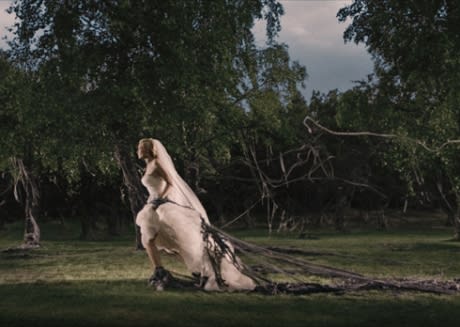Melancholia begins with an eight-minute montage of stunning imagery—a bride walking in the slowest-of-slow motion with grey woolen skeins bound around her legs, a reproduction of Pieter Bruegel the Elder's The Hunters in the Snow getting consumed by flames, a tiny planet being engulfed by a larger one—set to Wilhelm Richard Wagner's prelude to "Tristan und Isolde". This is clearly an apocalypse movie unlike any other.
Lars von Trier's unjustly overlooked 2011 film is split into two parts. The first part documents the lavish, tragicomic wedding reception being held for Justine (Kirsten Dunst). While she tries to play the part of the joyful bride, her parents' speeches, including her mother's doomsday proclamation to "enjoy it while it lasts", and her bridal duties draw out her feelings of melancholia. Justine longs to be "normal" and "happy", but what she feels is exhaustion from her metaphysical worries and helplessness toward the depression that is about to sweep over her.
The second part takes the annihilation anxiety and mental disorder of Justine's story and turns them into a metaphor about the end of the earth. A planet called Melancholia that has been hiding behind the sun is on a path to either pass close by or crash into our planet. Von Trier follows Justine, her sister Claire (Charlotte Gainsbourg) and Claire's family during the days leading up to this potential cosmic catastrophe, watching their varied reactions.
The second film (after Antichrist) born out of the director's own battle with depression, Melancholia becomes the story of two sisters who fall to pieces in response to seemingly dissimilar events. While Justine is unable to hold it together during an event typically thought of as ideal—her wedding day and all its implications of success, devotion and contentment—she functions surprisingly well in the face of disaster. Claire manages her day-to-day life in a seemingly positive and admirable manner—by being orderly, by nursing her sister, by nurturing her child—but she can't cope with the powerlessness and panic she feels in the face of incomprehensible doom. As we watch the sisters cope with their terror of the unknown, it becomes apparent that fear and apprehension are as debilitating as depression.
Melancholia privileges the emotional and the intuitive rather than the rational and the scientific. Its images and ideas, the tone conjured by its romantic musical score, the foggy, dreamy, isolated world it depicts—all linger with you in a powerfully evocative, ambiguous way long after the end credits have rolled. Watching this beautiful, thoughtful and occasionally funny film you can't help but wonder what you would do if the world were about to come to an end. And since the world will come to an end for each of us—just hopefully not in the cataclysmic manner depicted here—this is a worthwhile question to ponder.
Melancholia screens at the TIFF Bell Lightbox as part of the Countdown to Armageddon screening series at 9:30pm on Sunday, December 16th, 2012.
(eOne)Lars von Trier's unjustly overlooked 2011 film is split into two parts. The first part documents the lavish, tragicomic wedding reception being held for Justine (Kirsten Dunst). While she tries to play the part of the joyful bride, her parents' speeches, including her mother's doomsday proclamation to "enjoy it while it lasts", and her bridal duties draw out her feelings of melancholia. Justine longs to be "normal" and "happy", but what she feels is exhaustion from her metaphysical worries and helplessness toward the depression that is about to sweep over her.
The second part takes the annihilation anxiety and mental disorder of Justine's story and turns them into a metaphor about the end of the earth. A planet called Melancholia that has been hiding behind the sun is on a path to either pass close by or crash into our planet. Von Trier follows Justine, her sister Claire (Charlotte Gainsbourg) and Claire's family during the days leading up to this potential cosmic catastrophe, watching their varied reactions.
The second film (after Antichrist) born out of the director's own battle with depression, Melancholia becomes the story of two sisters who fall to pieces in response to seemingly dissimilar events. While Justine is unable to hold it together during an event typically thought of as ideal—her wedding day and all its implications of success, devotion and contentment—she functions surprisingly well in the face of disaster. Claire manages her day-to-day life in a seemingly positive and admirable manner—by being orderly, by nursing her sister, by nurturing her child—but she can't cope with the powerlessness and panic she feels in the face of incomprehensible doom. As we watch the sisters cope with their terror of the unknown, it becomes apparent that fear and apprehension are as debilitating as depression.
Melancholia privileges the emotional and the intuitive rather than the rational and the scientific. Its images and ideas, the tone conjured by its romantic musical score, the foggy, dreamy, isolated world it depicts—all linger with you in a powerfully evocative, ambiguous way long after the end credits have rolled. Watching this beautiful, thoughtful and occasionally funny film you can't help but wonder what you would do if the world were about to come to an end. And since the world will come to an end for each of us—just hopefully not in the cataclysmic manner depicted here—this is a worthwhile question to ponder.
Melancholia screens at the TIFF Bell Lightbox as part of the Countdown to Armageddon screening series at 9:30pm on Sunday, December 16th, 2012.
